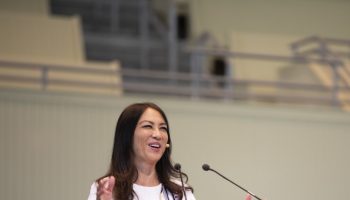From 1890 through 1920, America experienced an influx of progressive ideas that advocated for a people’s government, detached from corporate control. This period, known as the Progressive Era, established systems of social welfare and political representation that remain part of the current system.
 At 2 p.m. Thursday, July 5 in the Hall of Philosophy, researcher John Halpin will discuss this movement and its lasting impacts on American history in his lecture “Faith and Politics in the Progressive Era.”
At 2 p.m. Thursday, July 5 in the Hall of Philosophy, researcher John Halpin will discuss this movement and its lasting impacts on American history in his lecture “Faith and Politics in the Progressive Era.”
“What I think is a liberating belief … is that our collective action, people participating in self-governance, can achieve greater national prosperity,” Halpin said in a podcast produced for Progressive Way. “I think that’s a great accomplishment of progressivism. I think it helped pave the way for a dramatic rise in America’s overall aggregate wealth and a better distribution, and more social protections for when things go the wrong way.”
Halpin is a senior fellow at the Center for American Progress and is the creator and co-director of the Progressive Studies Program, a research project that studies the history and impact of progressivism. During his lecture, he will share years of analysis of the Progressive Era by providing political and religious context.
Progressivism, he said, emerged as a response to the country’s failure to support its people.
“The architecture for federal government really wasn’t put in place until we fought a big war in World War I and then later when we tried to address a depression,” he said in the Progressive Way podcast. “We didn’t have any mechanisms for dealing with problems that arose. What was happening in the late 19th century were huge amounts of problems associated with the transition from primarily a rural agrarian economy to industrialism.”
Politically and economically, Halpin said the nation was riddled with corruption. The shift to industrialism concentrated the wealth within large corporate conglomerates, giving rise to mass poverty.
“A lot of people were moving into wage work and there was a lot of immigration in the country, so you ended up with large levels of poverty, … and these corporate forces would just outright buy state legislators and senators,” he said in the podcast. “The U.S. Senate was basically just a vehicle just for corporate interests, so you had massive levels of economic hardship and outright poverty.”
To combat the inequity, progressives realized they needed a voice for their frustrations. They pushed for reforms like the direct election of senators and the appointment of municipal boards, both of which exist today.
“Much of what the original progressives did was to identify the social and economic problems that needed to be addressed and attack the prevailing theories that were keeping the system as it was and protecting the status quo,” Halpin said in the podcast. “Then they embarked on a series of direct political campaigns to try and reform these things at the municipal, state and federal level.”
But beyond political reform, Halpin believes it is just as important to acknowledge the spirit of the Progressive Era. Progressives fought fiercely against a government that had seemingly forgotten its people and submitted to a consolidation of power and wealth.
Without finding the same passion that fueled this 30-year period, Halpin doubts modern reform efforts will succeed.
“I think you need to draw from the spirit of reform and the notion of the government working in the interest of average people on behalf of national goals,” Halpin said in the podcast. “That’s an animating impulse that I think has been lost. Some of the major concerns of the early progressives, particularly on social egalitarian measures, are something we should be considering today.”
Halpin’s lecture, a combination of political and spiritual discussion, concludes the Week Two Interfaith theme “Religion and American Identity.”




